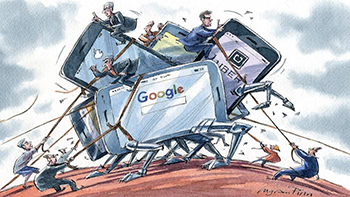
The other day Angela Merkel took a few hours out from the cacophony of day-to-day politics. Putting to one side migration, the eurozone, Russia and Ukraine, Brexit and the rest, the chancellor gave a speech about algorithms. Yes, algorithms.
几天前,安格拉.默克尔(Angela Merkel)抽出几小时暂别喧嚣的日常政治。德国总理把移民、欧元区、俄罗斯和乌克兰、英国退欧以及其他事宜搁置一边,发表了关于算法的演讲。没错,就是算法。
Her message to an audience in Munich was that the search engines that deliver news on websites such as Google and Facebook are creating distorting prisms. The closely guarded formulas, or algorithms, used by these companies to tailor the output to recorded personal preferences can create echo chambers. Citizens eventually may receive only the news that fits their prejudices — a gift to today’s populist proponents of post-truth politics. Healthy democracies depend on the wide exposure of conflicting ideas and interpretations.
她在慕尼黑向听众传达的信息是,在谷歌(Google)和Facebook等网站发布新闻的搜索引擎正在创造扭曲的棱镜。这些公司根据记录下来的个人偏好,运用高度保密的公式(即算法)来定制内容,这可能制造出“回音室”。公民们最终只会看到符合他们偏见的新闻——这对当今“后真相政治”的民粹主义鼓吹者是一份大礼。健康的民主体制有赖于民众全面接触各种观点和解读的碰撞。
At the very least, Ms Merkel said, it was incumbent on the technology companies to be transparent about the way the algorithms are constructed, so viewers and readers understood they are being offered a strictly limited perspective on the world around them.
默克尔表示,科技公司至少有义务公开算法的构建方式,让观众和读者们明白自己获得的世界视角是严格受限的。
A couple of days later an employment court in London ruled in favour of Uber drivers who had complained that their contracts wrongly denied them basic employment rights such as the minimum wage and paid holidays. Uber, the court said, could not pretend they were entirely independent contractors.
两天后,伦敦一个雇佣法庭做出了支持优步(Uber)司机主张的判决,这些司机此前抱怨,他们的劳动合同错误地没有给予他们最低工资和带薪休假等基本雇佣权利。该法庭表示,优步不能假装他们是完全独立的承包商。
As striking as the court’s judgment was the robust language in which it was couched. The notion that the London operations of Uber, Judge Anthony Snelson remarked laconically, represented a mosaic of some 30,000 small businesses linked by Uber’s technology platform, was “faintly ridiculous”. The company had resorted to fictitious and twisted language and had even invented “brand new terminology” in the effort to hoodwink the court.
和法庭判决内容同样引人注目的是判决书所用的有力措辞。安东尼.斯内尔森法官(Judge Anthony Snelson)精辟地说道,有关优步伦敦业务代表着依靠其技术平台连接起来的大约3万家小企业的说法“有些可笑”。优步求助于虚构且不通的语言,甚至发明了“全新术语”来糊弄法庭。
Uber has said it will appeal against the decision. Many lawyers think it more likely the judgment will improve the working conditions of hundreds of thousands of people now employed in Britain’s casual, or “gig”, economy.
优步表示将提起上诉。许多律师认为更有可能的情况是,该判决将会改善如今受雇于英国零工经济的数十万人的工作条件。
You would have to be a conspiracy theorist of Trumpian proportions to connect these two events in different European cities. And yet they tell much the same story. Ms Merkel’s speech and Mr Snelson’s ruling are straws in a wind that is changing the weather in Europe for the mainly American technology groups. Not so long ago the digital innovators and disrupters seemed set to sweep all before them. Now politicians and regulators are pushing back.
你得是特朗普那种水平的阴谋论者才能将发生于欧洲不同城市的这两件事联系起来。然而它们在本质上确实是一回事。对以美国为主的科技集团来说,默克尔的演讲和斯内尔森法官的判决是欧洲风向改变的迹象。就在不久前,数字创新者和颠覆者似乎还势不可挡。如今政客和监管机构正在反击。
Of course, opposition to Uber and Airbnb, its rent-an-apartment equivalent, is not confined to one side of the Atlantic. The governor of New York has signed into law severe restrictions on Airbnb’s operations in the state and Uber has faced battles with its drivers in several US cities. But it is in Europe that you sense the deeper disquiet about the economic and societal effect of these technologies.
当然,反对优步和公寓租赁服务网站Airbnb的不仅仅局限于大西洋的一边。纽约州州长签署法令严格限制Airbnb在该州的运营,而优步在美国多个城市遭遇其司机的抗争。但在欧洲,你感觉人们对这些技术带来的经济和社会影响的担忧更为深切。
Another manifestation came in the summer with the European Commission’s imposition of a EURO13bn fine on Apple. The company’s aggressive tax avoidance — framed, it should be said, in collusion with a previous Irish government — ran foul of competition laws. The Brussels commission has few admirers these days in EU member states but applause for the fine echoed across the continent’s capitals.
今夏欧盟委员会(European Commission)对苹果(Apple)罚款130亿欧元是另一个明证。该公司激进的避税手法——应该指出是与之前的爱尔兰政府联手炮制的——违反了反垄断法。如今欧盟成员国几乎没有人对欧盟委员会抱有好感,但这一罚单在各国首都赢得赞赏。
Apple is not alone. The commission is investigating Amazon’s tax affairs and has launched a probe into whether Google has broken antitrust rules. Facebook has bowed to pressure and agreed to book more of its sales in the UK rather than the Republic of Ireland, which has a lower corporate tax rate.
苹果并非个例。欧盟委员会正在调查亚马逊(Amazon)的税务安排,并对谷歌(Google)是否违反了反垄断规则展开调查。Facebook屈从于压力,同意在英国(而非爱尔兰)申报更多的销售收入——爱尔兰的企业税率更低一些。
Google, which has had its offices in Paris and Madrid raided by tax inspectors, may do something similar.
谷歌在巴黎和马德里的办公室遭到税务机关的突击搜查,该公司可能也会屈服。
There is a suspicion in Washington that all this is part of a protectionist plot. Europeans are simply unhappy with the way US companies dominate the marketplace. And there is something to that charge. It is probably no accident that German media businesses are among the sharpest critics of the mysteries of search engine algorithms.
华盛顿有人怀疑,所有这些都是保护主义阴谋的一部分。欧洲人只是对美国企业主导市场的格局感到不快。这种怀疑有一定道理。德国媒体界跻身于最猛烈抨击搜索引擎神秘算法的行列,很可能并非偶然。
There is also something else: a collision between Silicon Valley’s “government get out of the way” disdain for anything that might dent its profits and a growing awareness among politicians of the public policy implications of the new technologies. It matters to Europe’s political leaders if voters are exposed only to views they agree with, or if workers are denied decent wages and social safety nets in the so-called sharing economy.
也有其他因素:硅谷对任何可能影响其利润的事情都采取“让政府走开”的不屑态度,而政客们日益意识到新技术对公共政策的潜在影响,两者存在冲突。如果选民只能获得他们认可的观点,如果劳动者在所谓的共享经济中无法获得体面的薪资和社会安全网,欧洲政治领导人不想管也得管。
Tim Cook, the chief executive of Apple, often sounds as if he believes his company should be free to decide how much it pays in taxes. Mr Cook thinks it is for Apple rather than elected politicians to decide where to strike the balance between personal privacy and national security in the use of encryption. He does not seem to have noticed that these are tough political times or that governments are no longer dazzled by all the technological hype.
苹果首席执行官蒂姆.库克(Tim Cook)往往给人的印象是,他相信自己的公司应该自由决定交多少税。库克认为,在加密技术的使用上,应该由苹果(而非民选产生的政客)决定个人隐私与国家安全之间的恰当平衡。他似乎没有注意到,当今的政治形势十分严峻,同时各国政府也不再对所有的技术炒作觉得了不起。
What is happening, I think, is that these businesses are being “socialised” — albeit slowly and with some kicking and screaming. The direction is as it should be. Technology companies cannot opt out of the responsibilities borne by other businesses. A rebalancing of the relationship between private profit and public welfare is overdue. Mr Cook would do best to stick with the clever gadgets.
我认为,现在发生的情况是,这些企业正在被“社会化”,尽管这个过程缓慢而且存在抵制。从大方向说,理应如此。科技公司不能逃避其他企业承担的责任。早就应该再平衡私人利润与公共福利之间的关系了。库克最好专注于推出智能设备。












